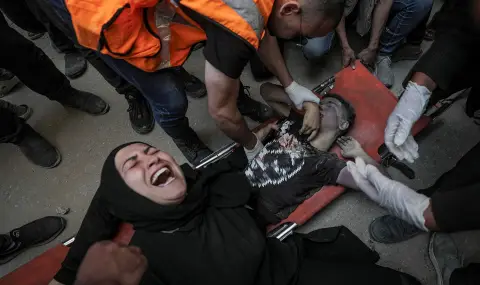Mahmoud and Nariman al-Fasih sit on a mattress in a tent with their two young children. The sandy floor is covered with plastic, and their clothes are drying by the window of the tent. Their four-year-old son Ryan and three-year-old daughter Nihad were born in Gaza City, where the family lived at the time, ARD reports.
The young family lives in "Al-Mawasi", where tens of thousands were forcibly displaced - in the so-called "safe zone". When their third child, Sila, was born, the family was forced to take the little girl into a tent a few hundred meters from the sea. She did not make it even four weeks. The night when little Sila died was "very cold", says the child's 31-year-old father. "I found her frozen and blue, there was blood on her nose and mouth", he recalls.
Temperatures below ten degrees
At night, temperatures drop below ten degrees, and the young man fails to insulate the tent with plastic, which is supposed to keep her warm. The hospital in Khan Yunis no longer even had the basic products needed for a newborn - milk, clothes, diapers. The man tells journalists from the German public media that he feels guilty towards his daughter: "I think I was unfair to her - that we brought her into a world in which I could not provide her with everything she needed". Sila did not want to breastfeed and needed formula milk, which was hard to find.
The family could not offer their newborn child either safety or warmth. "You see, this tent is made of canvas, it is terribly cold at night - like a freezer", says Mahmoud. This tent is not really suitable for anything. When his wife, Nariman, was pregnant, she felt unwell. "I could not take care of her because we were not at home".
More and more premature babies
The neonatology department at the "Nasser" hospital in Khan Yunis currently has beds for only 30 babies, and this number includes premature babies who need incubators. Doctors are paying special attention to this department now. "Because of the extremely low temperatures and the increasing number of premature babies", explains Dr. Ahmed Al-Fara.
The 52-year-old head of the department says that a newborn should not be cared for in a tent and hopes that the war in the Gaza Strip will end soon so that people can return to their homes, writes ARD. However, he knows that "these are wishes that are difficult to fulfill at the moment".
Babies should not lose their body temperature
The doctor and his colleagues have started giving their patients prescriptions that no one taught them in medical schools. For example, that the corners of the tent should be well secured, or that babies should be dressed in as much clothing as possible so that they "do not lose any of their body temperature".
Another advice from the pediatrician to parents is to place their babies in wooden boxes when they are not feeding - as long as they can get hold of such. Or at least in a cardboard box with air holes where the baby can be placed so that they do not get cold.
"Let's live like before the war”
The daughter of the Fasih family did not live to see the new year. What does the father wish for 2025? "Let's live in peace and safety, for my children to live with dignity, for this war to end and for my soul to find peace again. "To live like before the war, and maybe even better," the man told ARD.
Mahmoud also hopes to be able to return to his home in Gaza City in 2025. The family's five-story house is "completely destroyed." The man lost his mother in the war, the husbands of his three sisters, as well as other relatives, neighbors and friends. Now he fears for the lives of his wife and two children because of the conditions they live in. "We are in mortal danger every day - not once, but thousands of times a day. We want to live with dignity and in peace, we are exhausted. Enough is enough."
Author: Clemens Ferencotte (ARD)
